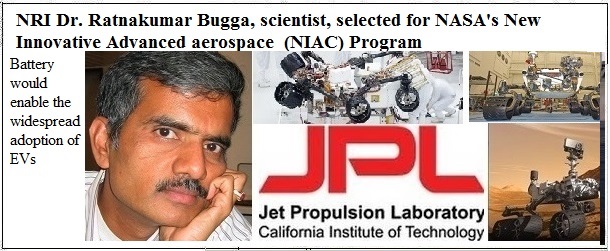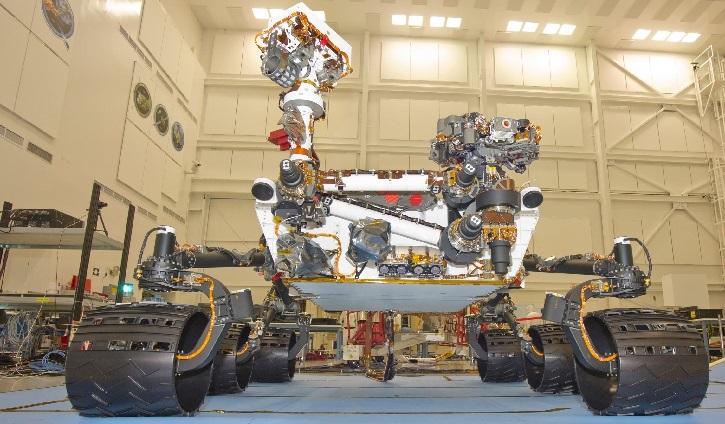| Connecting
over 25 millions NRIs worldwide |
|
|||||||||||||||||||||||
|
||
|
Los Angeles, April 11, 2016 Dr. Ratnakumar Bugga, Ph.D.in Electrochemistry from Indian Institute fo Science, Bangalore, India, now is working as Senior Member Technical Staff, Electrochemical Technologies Group NASA Jet Propulsion Laboratory, Pasadena, California USA, selected for NASA's Innovative Advanced Concepts (NIAC) programme. NIAC (NASA Innovative Advanced Concepts) Program nurtures visionary ideas that could transform future NASA missions with the creation of breakthroughs — radically better or entirely new aerospace concepts — while engaging America's innovators and entrepreneurs as partners in the journey. The program seeks innovations from diverse and non-traditional sources and NIAC projects study innovative, technically credible, advanced concepts that could one day “change the possible” in aerospace.
At NASA's Jet Propulsion Laboratory (JPL), Metal Hydride-Air Battery- Safe, High Energy and Robust Aqueous Batteries for EVs program, Dr. Ratnakumar Bugga is highly involved. Innovative approaches to EV battery technologies and manufacturing present the opportunity to maximize stored energy relative to the weight of EVs, allowing for up to three times the driving range. These new battery chemistries and designs prevent overheating, are immune to catastrophic failure, and can be incorporated into the structure of a vehicle to improve strength in some cases. Much of this can be accomplished at a 30% lower cost compared to conventional batteries, thus bolstering widespread adoption of EVs. To run the programs, Dr. Ratnakumar Bugga's team got awards $250,000 for Rechargeable Lithium Ion Battery Operation Model in 2011, $749,000 in 2010 and $100,000 for Modeling and Verification of Li-Ion Cells Under Accelerated Life Testing. If successful, JPL's battery would enable the widespread adoption of EVs by offering a safe, low-cost alternative to existing technologies. Primary batteries survive only for 1-2 hours. VIP-INSPR will refill hydrogen on one end and provide power on the other side continuously, thus enabling sustained exploration of the Venus atmosphere. The Venus Interior Probe could lead to new methods of power generation for planetary missions to Venus or for Earth applications Mr. Bugga got B.S. in Math, Physics and Chemistry from Silver Jubille College, Kurnool, A.P. , Masters, M.S. in Chemistry from S.V. University, Ananthapur, A.P., and Ph.D. in Electrochemistry from Indian Institute fo Science, Bangalore, India -------------------------------------- - New York, April 9, 2016, (IANS) An Indian-origin scientist's proposal has been selected for NASA's Innovative Advanced Concepts (NIAC) programme -- an initiative that invests in transformative architectures through the development of pioneering technologies.
|
||
| |
|


